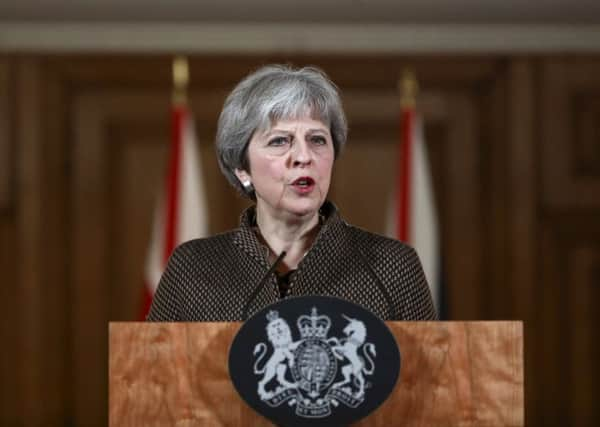The Yorkshire Post says: Why Theresa May had to act over Syria. PM faces Commons inquisition


Then, Mrs May’s predecessor, David Cameron, asked for Parliament to be recalled in the belief that MPs would endorse targeted military action against Bashar al-Assad’s evil regime. They did not after a late change of heart by Doncaster’s Ed Miliband, the then Labour leader, saw the Government defeated after the Opposition joined forces with Tory rebels.
And it could be argued that the cumulative consequence of this inaction, coupled with President Barack Obama’s reluctance to enforce his own ‘red lines’, was the slaughter of the innocents 10 days ago when Syrian civilians enduring a living hell in Douma were subjected to a horrific chemical attack that broke all global protocols on war.
Advertisement
Hide AdAdvertisement
Hide AdThat’s why the Prime Minister acted in the way she did. Though the RAF have, in recent times, had a very limited role in the Syrian conflict, the self-same people now accusing the Tory leader of recklessness are the same critics who would have been accusing her of cowardice if this country delayed and dithered any longer, even more so after the recent nerve agent attack on the streets of Salisbury against a former Russian spy.
What would they have done? They certainly haven’t set out a coherent alternative plan while there’s every likelihood that the past weekend’s airstrikes have, at the very least, curtailed and compromised the Syrian regime’s ability to use chemical weapons for now. Isn’t this what the hand-wringing Jeremy Corbyn, the current Opposition leader, and others, wanted?
Humanitarianism often requires the toughest of choices. As Mrs May said: “History teaches us that the international community must defend the global rules and standards that keep us all safe.” And this is reflected by the desperate pleas from help from Syrian refugees who believe they have been let down by the world for too long.
Furthermore, it’s not always practical to seek Parliamentary approval first – a convention that is one of the legacies of the 2003 Iraq invasion. Not only would it give Britain’s enemies – Syria in this instance – advance warning of this country’s intentions so they can prepare accordingly, but the Commons was not sitting last week and Mrs May decided, on the balance of probabilities, that a joint operation with the USA and France was in the national interest and had the potential to acts as a warning to others. Even the EU has announced its support for this attack.
Advertisement
Hide AdAdvertisement
Hide AdIt was also not an unilateral decision on Mrs May’s part, despite a need for operational security. Stressing the need to save lives in the future, the PM did set out the legal basis for the action after seeking her Cabinet’s prior approval once it became clear that the United Nations was powerless after Russia used its veto. She’s been more collaborative than some of her others and was at pains to brief Opposition leaders.
These are the judgement calls that this country expects of its prime ministers and Mrs May appears, so far, to have acted responsibly while stressing her desire for Britain not to become embroiled in Syria’s impenetrable civil war. Her challenge today is reassuring MPs about her motives, allaying those who fear ‘mission creep’ if Assad’s tyranny continues unchecked and setting out the diplomatic offensive that will, presumably, follow these airstrikes. If not, she will be handing a tactical advantage to her opponents.